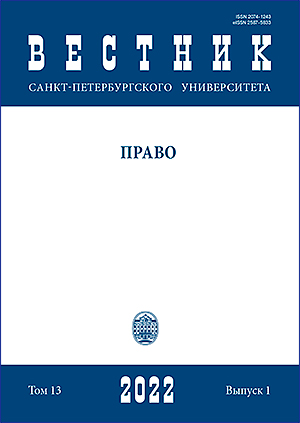United States policy and legislation on the exploration of natural resources of celestial bodies (international legal aspects)
DOI:
https://doi.org/10.21638/spbu14.2022.109Abstract
The present article attempts to integrate and comprehensively analyze the main stages in the formation and development of the U. S. policy and legislation on the use of outer space, including the Moon and other celestial bodies. In connection with recent announcements — the new lunar space program “Artemis” launched by NASA in May 2019, negotiations on bilateral “Artemis Accords” with potential partners in May 2020 (concluded by the U. S. with several states in October 2020), and Donald Trump’s Executive Order on Encouraging International Support for the Recovery and Use of Space Resources — the article focuses on U. S. policy and legislation in the light of the principles and norms enshrined in the following space treaties: the Outer Space Treaty, 1967 (main space treaty), and the Moon Agreement, 1979. The authors, using historical-legal, formal-legal, and comparative legal methods, show the changing position of the U. S. taken by their delegation during the drafting of the aforementioned international treaties, and the U. S. authorities’’ constant adjustment of their national policy and legislation on the exploration of space and its natural resources. To clarify the initial U. S. Position on key aspects, the authors refer to the travaux preparatoires of both the Outer Space Treaty, 1967, and “uncertainty” (according to the U. S. authorities, which had been the active drafter at the time) of the Moon Agreement, 1979. Condensed opinions of leading space experts and famous researchers on international space law are submitted in the article resulting for the authors in: U. S. pursue destructive policy aiming at undermining enshrined in the Outer Space Treaty, 1967, fundamental basis of international space law.
Keywords:
United States space policy, United States space legislation, common heritage of mankind, space resources, international space law, exploitation of lunar resources
Downloads
References
Downloads
Published
How to Cite
Issue
Section
License
Articles of "Vestnik of Saint Petersburg University. Law" are open access distributed under the terms of the License Agreement with Saint Petersburg State University, which permits to the authors unrestricted distribution and self-archiving free of charge.






